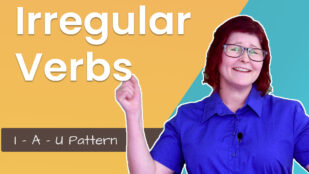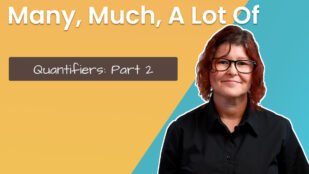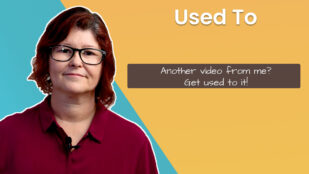Present Tense for an Anecdote
Firstly, what’s an anecdote? An anecdote is a short amusing or interesting story about a real incident or person. In other words, something that really happened in the past to yourself or someone else. Present tense for anecdote in the past? What??? It sounds a bit strange, but we can use the present tense, to…
Verb Patterns for Preference
How to use PREFERENCE words with Verbs. We know that we can use ‘like’ to talk about something that we think is good. “I like apples.” “I like dogs.” The form is like + noun. You’ve got that! No problem. However, we can also use ‘like’ ‘love’ or ‘enjoy’ to talk about our preferences for…
Irregular Verbs (I – A – U)
Today I talk about the most annoying type of irregular verb – those that follow the i to a to u pattern.
Dropping The Article
When and why do we drop the definite article when talking about some institutions? In British English, leaving out ‘the’ when talking about some institutions can cause confusion for both English learners and native speakers. These rules are used in both the UK and Australia, but there can be slightly different rules in North America.…
Quantifiers: No, None, None Of
This video is the last in this series about quantifiers – those words that show us an amount of something. Today, we look at no, none, and none of – the negatives. No No is a determiner – a word that identifies a noun in more detail. Use no before countable and uncountable nouns. Examples:–…
Quantifiers: Many, Much, A Lot Of
In my previous video, you found out how to use some and any – great! (And if you haven’t seen it you can find it here) But what about a lot of, many and much? Are they interchangeable? Do they form part of any idioms? Check out my new video, which is the second in…
Quantifiers: Some and Any
This is the first in a series of videos and blog posts about common quantifiers – those words that describe an amount of something. Can I have any milk with my tea? ✘ Can I have some milk with my tea? ✓ If you have ever made this mistake, then read on – you might…
Used To
This is my guide to: Used to, use to, be used to, get used to, never used to, not like (I) used to. Sounds confusing, doesn’t it? Well, fear not, because my video explains all these different variations. You can watch it here, or read on… or both! Before we get to the phrase…
Will or Going To
In English, the way we see the future affects the way we talk about the future. How certain we are of something is apparent in the way we express ourselves in future terms. There are four different ways to express the future in English. We can use will (sometimes called future simple), going to, present…


 ****************************************@
****************************************@ **********************************@
**********************************@ ***************************@
***************************@ ***********************@
***********************@ *************************************@
*************************************@ ****************************************@
****************************************@ ******************************@
******************************@ *************@
*************@ ************************@
************************@